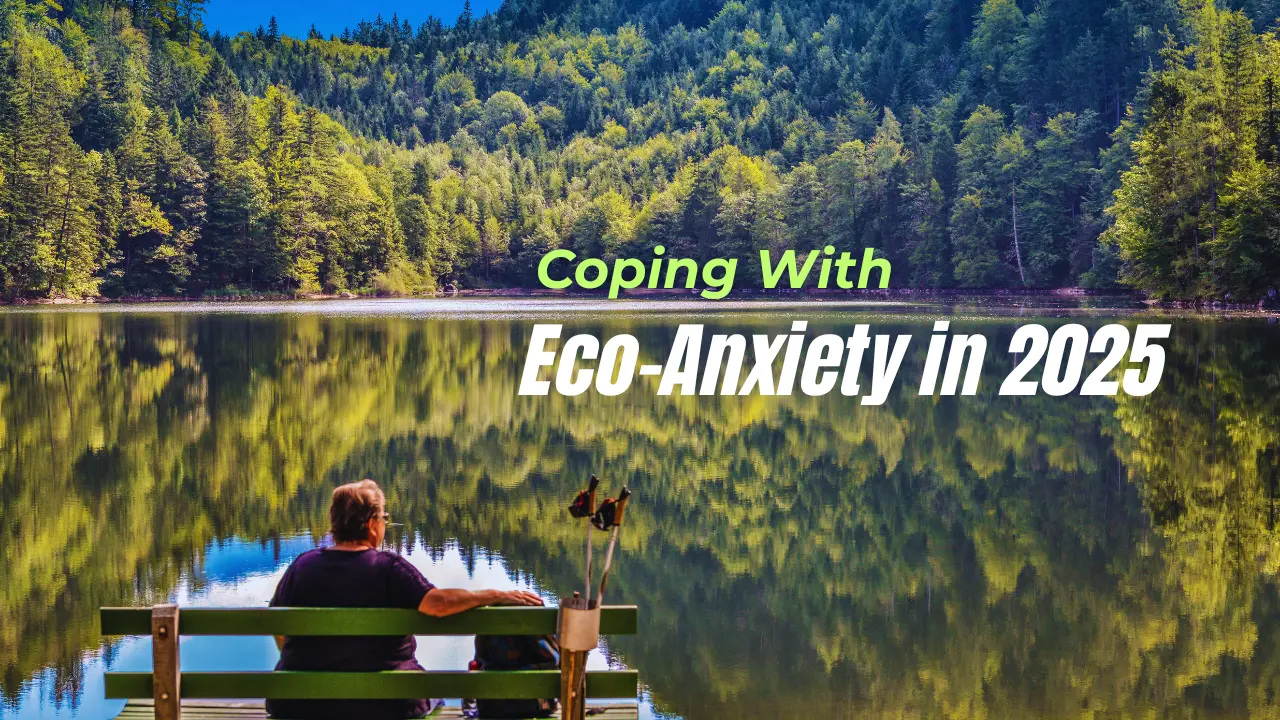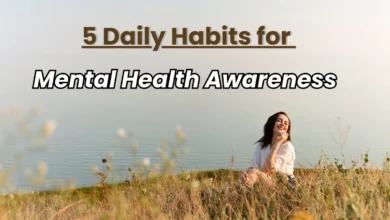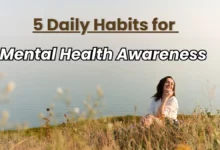Eco-Anxiety in 2025: Why Climate Stress Feels Overwhelming

Introduction: When Caring Feels Heavy
Have you been feeling overwhelmed lately by headlines about wildfires, melting glaciers, or vanishing species? If so, you might be experiencing eco-anxiety in 2025—a rising emotional response to the state of our planet. That creeping worry about the environment isn’t just “too much empathy”—it has a name, and it’s becoming more common every year.
If you’re feeling more emotionally drained by environmental issues in 2025 than ever before, you’re not alone. Eco-anxiety is especially affecting youth, parents, and those closely following climate change.
Although it’s a challenging experience, it’s not without hope. You can care deeply about the Earth without losing your mental peace. This blog will help you understand eco-anxiety, what causes it, how to recognize it, and most importantly—how to cope in healthy, sustainable ways.
What Is Eco-Anxiety?
Eco-anxiety, also referred to as climate stress or environmental anxiety, is a psychological response to real or perceived threats to the environment. It’s not a clinical disorder, but rather a growing mental health phenomenon caused by fear of ecological disaster.
The American Psychological Association defines eco-anxiety as “a chronic fear of environmental doom.” It can show up as grief, anger, helplessness, or even guilt about our individual impact on the planet—commonly known as eco guilt.
In 2025, this form of anxiety is more visible than ever. Because we’re more connected to global news through smartphones and social media, we’re witnessing climate-related crises unfold in real time. As a result, people are experiencing climate change anxiety that affects both their emotions and daily functioning.
Why Eco-Anxiety Is Rising in 2025
There are several reasons why eco-anxiety in 2025 has become so prevalent. It’s important to understand the causes so we can develop compassion—for ourselves and others.
1.Overexposure to Climate Crisis News
Thanks to 24/7 news updates, it’s nearly impossible to avoid headlines about wildfires, floods, and pollution. Even though staying informed is important, constant exposure can lead to emotional exhaustion. In many cases, people begin to feel paralyzed by fear.
2. Political Inaction and Delayed Responses
One major source of climate despair is the feeling that governments and corporations aren’t doing enough. While individuals try to recycle or reduce emissions, large-scale inaction creates a sense of powerlessness. As a result, people lose faith in change.
3. Future Uncertainty and Fear of Collapse
People, especially younger generations, worry about what the future will look like. Will food become scarce? Will cities flood? Will they be able to raise families in a safe world? This future fear creates a continuous low-level stress that erodes mental wellbeing.
4. Personal Guilt and Pressure to Be Perfectly Green
Even well-meaning people feel eco guilt. For instance, someone might feel bad for flying once a year or using a plastic bottle in a moment of need. This pressure to be “100% eco-friendly” is unsustainable and can lead to shame and burnout.
Symptoms of Eco-Anxiety (How It Shows Up)
Like other types of anxiety, climate change anxiety doesn’t look the same for everyone. However, certain patterns are common among people who struggle with it regularly.
You may be experiencing eco-anxiety if you notice:
- Racing thoughts about environmental collapse
- Sleep problems after reading or watching climate news
- Avoidance of climate-related conversations out of fear or helplessness
- Emotional numbness or shutdown when faced with ecological topics
- Constant worry about the future of the planet and upcoming generations
- Irritability or guilt over personal environmental choices
Although these symptoms may seem overwhelming, they are manageable with the right mindset and strategies.
How to Cope with Eco-Anxiety in 2025 (Proven Strategies)
Now that we’ve identified the problem, let’s focus on solutions. Thankfully, there are many ways to deal with eco-anxiety in 2025—without ignoring reality or disconnecting from your values.
1. Set Healthy Media Boundaries
Yes, staying informed matters. But if you find yourself doomscrolling late at night, it’s time to reassess. Try limiting your climate news intake to a specific time each day. You might also consider following solution-focused platforms that highlight environmental progress.
In other words, consume with intention—not addiction.
2.Take Meaningful (Not Perfect) Action
Small actions can reduce anxiety. Composting, supporting eco-conscious brands, reducing plastic, or voting for green leaders can make you feel empowered. The goal is not perfection, but consistency.
“The greatest threat to our planet is the belief that someone else will save it.”
— Robert Swan
Remember this: You don’t have to do everything. You just have to do something.
3. Practice Mindfulness and Grounding
When emotions become overwhelming, come back to your body. Deep breathing, stretching, or mindful walking can help. One powerful technique is “5-4-3-2-1,” where you ground yourself by identifying things you can see, touch, hear, smell, and taste.
This helps you return from future-focused fear to present-moment calm.
“You can’t pour from an empty cup. Take care of yourself first.”
4. Connect with Others Who Care
Isolation makes anxiety worse. Consider joining a climate action group, sustainability club, or online community that shares your concerns. Talking to others helps you process your feelings—and reminds you that you’re not alone.
As environmentalist Jane Goodall said, “What you do makes a difference, and you have to decide what kind of difference you want to make.”
5. Seek Climate-Informed Therapy
In 2025, more mental health professionals are trained in climate-aware therapy. If your climate stress is affecting your daily life, relationships, or sleep, don’t hesitate to talk to someone. Therapy can help you unpack eco-anxiety, manage guilt, and build emotional resilience.
Bonus: Journal Prompts for Climate Clarity
Writing is a powerful coping tool. Here are a few prompts you can use:
- “What’s one small habit I can change that aligns with my values?”
- “What environmental progress gives me hope right now?”
- “How can I balance caring deeply with protecting my peace?”
Journaling helps you process complicated emotions without judgment. It’s a safe place to sort through hope, fear, and everything in between.
Conclusion: Hope and Action Can Coexist
To care about the planet is to feel deeply. That’s not weakness—it’s wisdom. But eco-anxiety in 2025 doesn’t have to drain your joy or steal your sleep. You can acknowledge the crisis and still cultivate peace.
Instead of falling into despair, shift your focus to progress, community, and meaningful change. Protect your energy as fiercely as you protect the environment. You’re allowed to care—and to rest, too.
The world needs your voice, but it also needs your wellness.










I don’t think the title of your article matches the content lol. Just kidding, mainly because I had some doubts after reading the article. https://accounts.binance.info/si-LK/register?ref=LBF8F65G
I don’t think the title of your article matches the content lol. Just kidding, mainly because I had some doubts after reading the article. https://accounts.binance.com/sv/register-person?ref=GQ1JXNRE
Thank you for your shening. I am worried that I lack creative ideas. It is your enticle that makes me full of hope. Thank you. But, I have a question, can you help me?
Your article helped me a lot, is there any more related content? Thanks! https://www.binance.com/register?ref=IHJUI7TF
Heard some buzz about j10game. Might be worth checking out if you’re hunting for something new to play. The site looks slick enough. Give it a spin j10game!
Your article helped me a lot, is there any more related content? Thanks!
Thank you for your sharing. I am worried that I lack creative ideas. It is your article that makes me full of hope. Thank you. But, I have a question, can you help me? https://www.binance.com/register?ref=IHJUI7TF
I don’t think the title of your article matches the content lol. Just kidding, mainly because I had some doubts after reading the article. https://accounts.binance.info/hu/register-person?ref=IQY5TET4
Your point of view caught my eye and was very interesting. Thanks. I have a question for you. https://accounts.binance.com/register-person?ref=IHJUI7TF
Your article helped me a lot, is there any more related content? Thanks! https://www.binance.com/register?ref=IHJUI7TF
Thank you for your sharing. I am worried that I lack creative ideas. It is your article that makes me full of hope. Thank you. But, I have a question, can you help me?
Thank you for your sharing. I am worried that I lack creative ideas. It is your article that makes me full of hope. Thank you. But, I have a question, can you help me? https://accounts.binance.com/cs/register-person?ref=OMM3XK51
Some genuinely select blog posts on this site, bookmarked.
Alright, gave phenjoycasino a spin. Interface is clean, games load fast. Might be worth a look if you’re bored. Find it here: phenjoycasino
Phenjoy, not my usual jam, but it’s alright. I could say I had better, yet it is totally passable and might suit one’s needs. Give it a look: phenjoy
Heads up, folks! If you’re looking to get in, check out this p828login. Hope it helps someone out there.
I don’t think the title of your article matches the content lol. Just kidding, mainly because I had some doubts after reading the article.
**mitolyn official**
Mitolyn is a carefully developed, plant-based formula created to help support metabolic efficiency and encourage healthy, lasting weight management.
**men balance pro**
MEN Balance Pro is a high-quality dietary supplement developed with research-informed support to help men maintain healthy prostate function.
**aqua sculpt**
aquasculpt is a premium metabolism-support supplement thoughtfully developed to help promote efficient fat utilization and steadier daily energy.
**herpafend official**
Herpafend is a natural wellness formula developed for individuals experiencing symptoms related to the herpes simplex virus. It is designed to help reduce the intensity and frequency of flare-ups while supporting the bodys immune defenses.
**prodentim official website**
ProDentim is a distinctive oral-care formula that pairs targeted probiotics with plant-based ingredients to encourage strong teeth, comfortable gums, and reliably fresh breath
**mounja boost**
MounjaBoost is a next-generation, plant-based supplement created to support metabolic activity, encourage natural fat utilization, and elevate daily energywithout extreme dieting or exhausting workout routines.
**prostafense**
ProstAfense is a premium, doctor-crafted supplement formulated to maintain optimal prostate function, enhance urinary performance, and support overall male wellness.
**neurosharp**
Neuro Sharp is an advanced cognitive support formula designed to help you stay mentally sharp, focused, and confident throughout your day.
**boostaro**
Boostaro is a purpose-built wellness formula created for men who want to strengthen vitality, confidence, and everyday performance.
**back biome official**
Mitolyn is a carefully developed, plant-based formula created to help support metabolic efficiency and encourage healthy, lasting weight management.